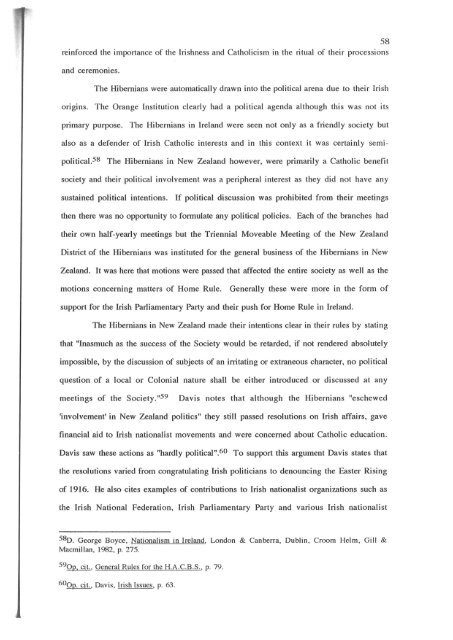TRANSPLANTED IRISH INSTITUTIONS - University of Canterbury
TRANSPLANTED IRISH INSTITUTIONS - University of Canterbury
TRANSPLANTED IRISH INSTITUTIONS - University of Canterbury
You also want an ePaper? Increase the reach of your titles
YUMPU automatically turns print PDFs into web optimized ePapers that Google loves.
58<br />
reinforced the importance <strong>of</strong> the Irishness and Catholicism in the ritual <strong>of</strong> their processions<br />
and ceremonies.<br />
The Hibernians were automatically drawn into the political arena due to their Irish<br />
origins. The Orange Institution clearly had a political agenda although this was not its<br />
primary purpose. The Hibernians in Ireland were seen not only as a friendly society but<br />
also as a defender <strong>of</strong> Irish Catholic interests and in this context it was certainly semipolitical.<br />
58 The Hibernians in New Zealand however, were primarily a Catholic benefit<br />
society and their political involvement was a peripheral interest as they did not have any<br />
sustained political intentions. If political discussion was prohibited from their meetings<br />
then there was no opportunity to fonnulate any political policies. Each <strong>of</strong> the branches had<br />
their own half-yearly meetings but the Triennial Moveable Meeting <strong>of</strong> the New Zealand<br />
District <strong>of</strong> the Hibernians was instituted for the general business <strong>of</strong> the Hibernians in New<br />
Zealand. It was here that motions were passed that affected the entire society as well as the<br />
motions concerning matters <strong>of</strong> Home Rule.<br />
Generally these were more in the form <strong>of</strong><br />
support for the Irish Parliamentary Party and their push for Home Rule in Ireland.<br />
The Hibernians in New Zealand made their intentions clear in their rules by stating<br />
that "Inasmuch as the success <strong>of</strong> the Society would be retarded, if not rendered absolutely<br />
impossible. by the discussion <strong>of</strong> subjects <strong>of</strong> an irritating or extraneous character. no political<br />
question <strong>of</strong> a local or Colonial nature shall be either introduced or discussed at any<br />
meetings <strong>of</strong> the Society."59<br />
Davis notes that although the Hibernians "eschewed<br />
'involvement' in New Zealand politics" they still passed resolutions on Irish affairs. gave<br />
financial aid to Irish nationalist movements and were concerned about Catholic education.<br />
Davis saw these actions as "hardly political".60 To support this argument Davis states that<br />
the resolutions varied from congratulating Irish politicians to denouncing the Easter Rising<br />
<strong>of</strong> 1916. He also cites examples <strong>of</strong> contributions to Irish nationalist organizations such as<br />
the Irish National Federation. Irish Parliamentary Party and various Irish nationalist<br />
58 0. George Boyce, Nationalism in Ireland, London & Canberra, Dublin, Croom Helm, Gill &<br />
Macmillan, 1982, p. 275.<br />
590p. cit., General Rules for the H.A .C.B.S., p. 79.<br />
60Op. cit., Davis, Irish Issues, p. 63.
















